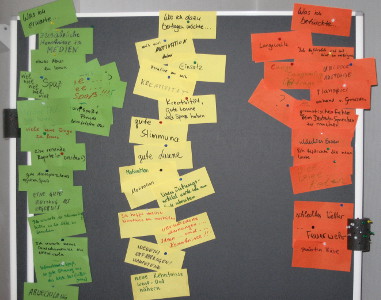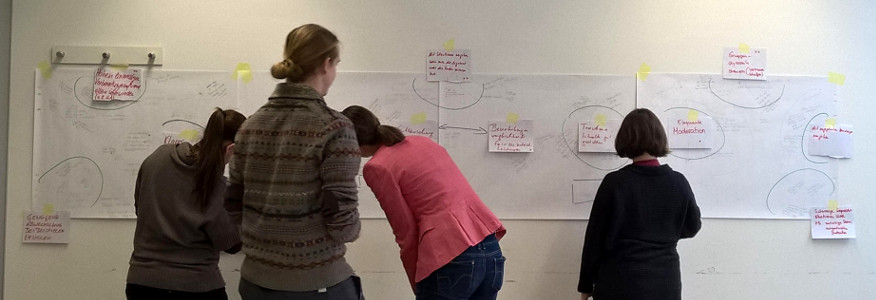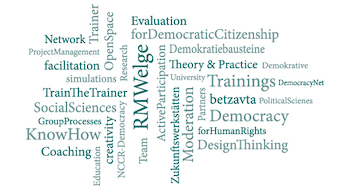 Moderators and lecturers need not only expertise, but also a wide range of skills to offer effective further training tailored to the target group.
Moderators and lecturers need not only expertise, but also a wide range of skills to offer effective further training tailored to the target group.
I have conceived and carried out further training and have gained a lot of experience as a facilitator and lecturer within the framework of peer-to-peer approaches, in experiental learning settings as well as in classical teaching settings. On my way I have benefited from numerous advanced training offers and regularly invest time in professional advanced training for specific methodic competencies and to further professionalize my facilitation skills.
For several years I have been passing on my experience to other facilitators and lecturers in the context of workshops, seminars and consultations. I offer introduction and further training in the areas of competence outlined below, as well as specific methods to design activating and motivating teaching and learning settings. The methods differ in both preparation and implementation effort and can be applied to different target groups and learning contexts as required.
Competence training enables facilitators to cultivate a positive attitude in seminars, create effective learning settings and professionally facilitate on the basis of a solid qualification that goes beyond the necessary specialist knowledge.
 Facilitators and lecturers should be able to fall back on a selection of suitable methods for carrying out interactive and target group-oriented events in line with the learning situation: Depending on requirements, this includes short team-building exercises that can be used to control group dynamics; methods for small or large group settings; moderation techniques that enable interactive learning setting and constructive discussion, such as effective brainstorming, outcome-oriented discussions, experiental exercises, or participatory evaluation techniques; as well as participatory methods that are suitable for designing entire seminar days / weeks, such as future workshops, scenario building, open space and much more.
Facilitators and lecturers should be able to fall back on a selection of suitable methods for carrying out interactive and target group-oriented events in line with the learning situation: Depending on requirements, this includes short team-building exercises that can be used to control group dynamics; methods for small or large group settings; moderation techniques that enable interactive learning setting and constructive discussion, such as effective brainstorming, outcome-oriented discussions, experiental exercises, or participatory evaluation techniques; as well as participatory methods that are suitable for designing entire seminar days / weeks, such as future workshops, scenario building, open space and much more.
Trainers need training.
Curious? Please [» contact] me if you are interested in a train-the-trainers format or would like support in the design of interactive teaching-learning settings.
| Competences | Main Components |
Moderation |
| - thematic neutrality - binding authority - presence - targeted questions - authentic style - guidung group processes |
› design effective learning settings |
» professional moderation |
| - experience in moderating groups - knowledge of the method - methods appropriate to the situation - exemplarity - flexible use of means - lively presentation - expertise |
› solid (professional) qualification |
|
| - constructive - curious about new things - open for unexpected developments |
› cultivate positive attitudes |
|
| Moderation and its main components. This overview is based on Mauer & Müllert (2007) Moderationsfibel, AG SPAK Bücher. | ||
[» back to offers] back to offers] [» go to train-the-trainers project example]


